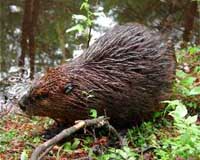 |
Victoria, Australia (SPX) Aug 06, 2010 Charles Darwin described the Venus Flytrap as 'one of the most wonderful plants in the world.' It's also one of the fastest as many an unfortunate insect taking a stroll across a leaf has discovered. But what powers this speed? Dr Andrej Pavlovic of Comenius University, Slovakia, has been studying the plants with the help of some specialised equipment and a few unlucky insects. In the wild the Venus Flytrap grows in the bogs and savannahs of North and South Carolina. This is not a healthy environment for many plants as it is low in the nitrogen to needed to build proteins. The Venus Flytrap has overcome this problem by developing a taste for meat. It has convex bi-lobed leaves with three trigger hairs on each lobe. When something knocks these hairs twice an electrical signal flips the leaves into concave shapes. If the captured creature struggles to escape it continues to tickle the trigger hairs. This causes the plant's trap to close tighter and release enzymes to digest its prey. Pavlovic looked at how the Flytraps snapped their leaves around their prey and thought that it might cost the plant energy to catch its food this way. To test his idea, he set up an infrared gas analyzer and a chlorophyll fluorescence imaging camera to watch the plants. He used a wire to make a trap snap and then simulated an insect struggling in the closed trap. Then he watched what happened as the plant caught its victim. Pavlovic said: "When a trap was triggered, photosynthesis slowed down and then recovered over ten minutes after the traps stopped being stimulated. In addition, the gas analyser showed an increase in respiration from the traps. To power the trap, the Venus Flytraps converted sugars they had photosynthesized back into carbon dioxide and energy. It is like an animal which also increases breathing when it has an increased demand for energy. The measurements showed that the effects are linked not to whether or not the trap is open, but to the stimulation of the trigger hairs. The measurements are connected with electrical signals produced by trigger hair irritation. These signals are similar to the signals which spread through the animal neurons." The results mean that the plants should not been seen as entirely passive. Pavlovic added: "These results show that the plant is as active as it appears and that it has adapted to trade-off the costs of lost photosynthesis against the benefits of additional nutrients from animal prey which in turn may later stimulate photosynthesis. This agrees with my earlier studies on carnivorous plants and shows why Venus Flytraps live in sunny habitats. The energy used in eating insects means that they need a lot of opportunity for photosynthesis, otherwise they lose more than they gain." It also suggests an answer to a question posed by Darwin over a century ago. Pavlovic noticed that when the traps closed there were gaps between the 'teeth' at the edge of the trap that a small creature could escape through. He said: "This could be an adaptive trait. Victims with little useful nitrogen can escape, ensuring the plant doesn't waste energy digesting them. The Venus Flytrap is not a merciless killer."
Share This Article With Planet Earth
Related Links Oxford University Press Darwin Today At TerraDaily.com
 Busy beavers wreak havoc in Latvia capital
Busy beavers wreak havoc in Latvia capitalRiga (AFP) Aug 5, 2010 Latvia's capital Riga is offering cash prizes to residents who can come up with the best ideas for stopping a busy colony of beavers from destroying trees and bushes along its picturesque canal. "We have no problems with the beavers. We have a problem with them felling trees," city spokeswoman Dzintra Abolina told AFP on Thursday, recalling how a a 100-year-old oak nearly fell victim to the ... read more |
|
| The content herein, unless otherwise known to be public domain, are Copyright 1995-2010 - SpaceDaily. AFP and UPI Wire Stories are copyright Agence France-Presse and United Press International. ESA Portal Reports are copyright European Space Agency. All NASA sourced material is public domain. Additional copyrights may apply in whole or part to other bona fide parties. Advertising does not imply endorsement,agreement or approval of any opinions, statements or information provided by SpaceDaily on any Web page published or hosted by SpaceDaily. Privacy Statement |